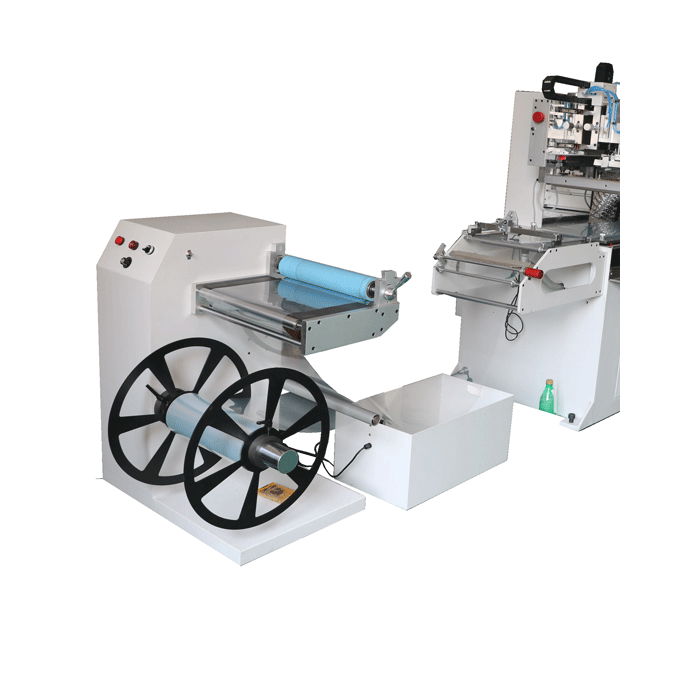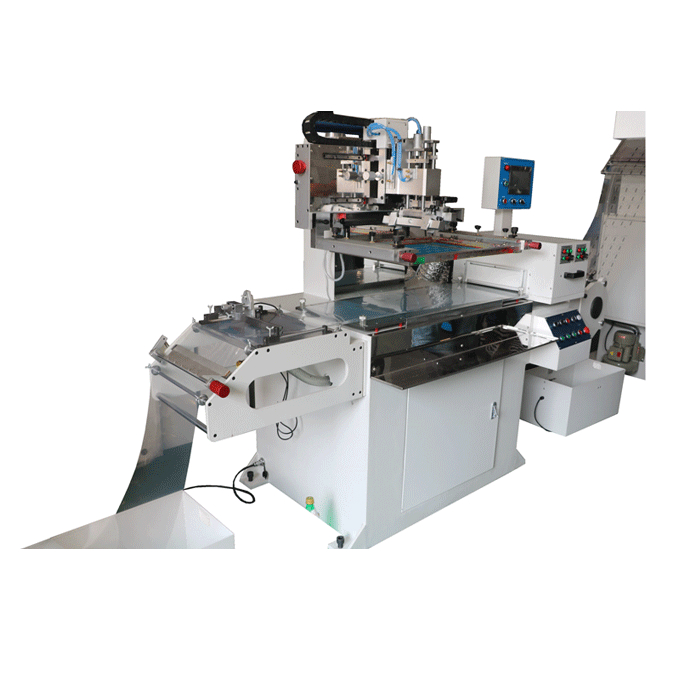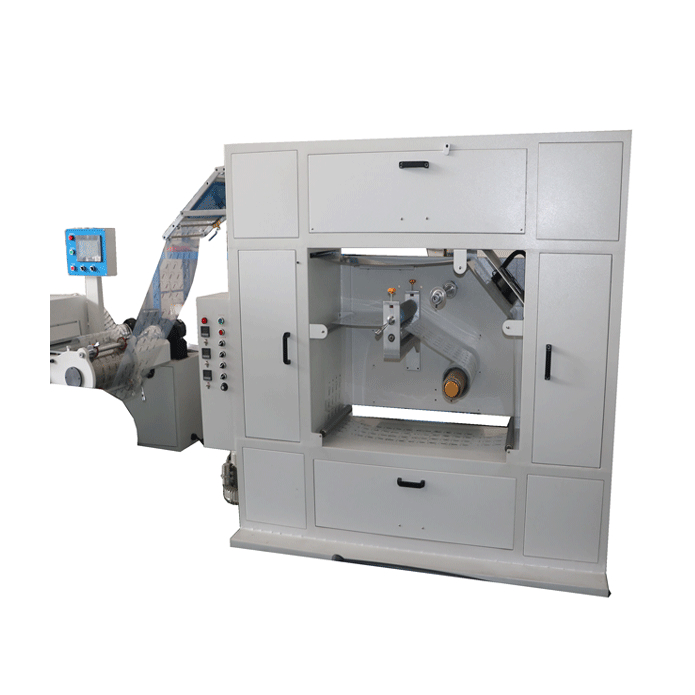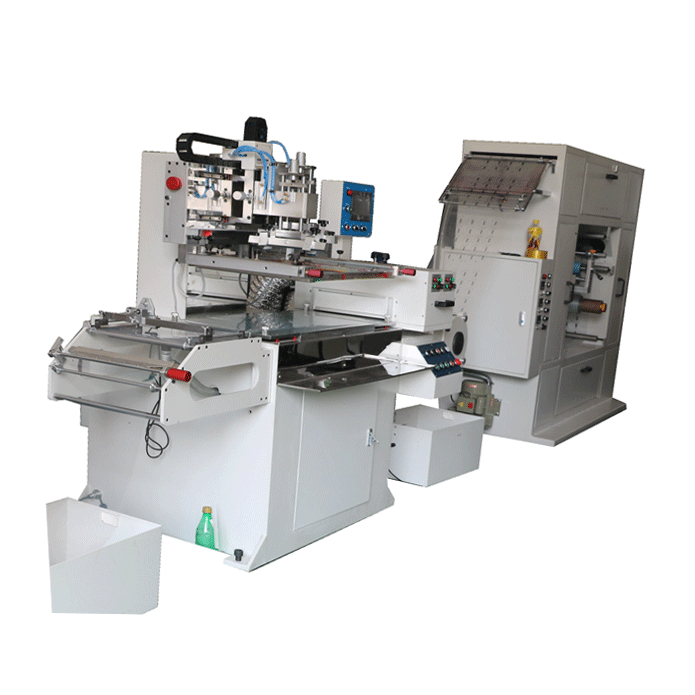Model No.︰SZD-R300
Brand Name︰KC
Country of Origin︰China
Unit Price︰US $ 26470 / pic
Minimum Order︰1 pic
Roll-to-roll film, paper, label screen printer
1. Automatic deflection correction system
• Functional principle: During the roll-to-roll printing of materials such as film, paper, and labels, the material may deviate during the conveying process. The automatic deflection correction system detects the position of the edge of the material through sensors, and when the material deviation is detected, the signal is fed back to the control system. The control system drives the deflection correction device, such as the deflection correction motor and the guide roller, to adjust the conveying direction of the material to ensure that the material always moves along the correct path and ensure the accuracy of the printing position.
• Importance: This system is crucial to ensure printing quality. If the material deviates, it will cause the position deviation of the printed pattern or text, affecting the consistency and aesthetics of the product, and automatic deflection correction can effectively avoid this situation.
2. Automatic tension control
• Working method: In roll-to-roll printing, the tension of the material needs to be kept stable. The automatic tension control system monitors the tension of the material in real time through the tension sensor and feeds back the tension signal to the controller. According to the set tension value, the controller adjusts the speed of unwinding and rewinding by controlling the speed of the motor or the brake device, thereby keeping the tension of the material constant throughout the printing process.
• Advantages: Stable tension can prevent the material from wrinkling, stretching or relaxing. For example, when printing thin films, unstable tension may cause the film to deform, affecting the printing accuracy and subsequent processing technology, while automatic tension control can improve the stability and reliability of printing.
3. Precision suction workbench
• Structure and function: The surface of the precision suction workbench is covered with tiny suction holes, and negative pressure is generated by the vacuum pump to firmly adsorb materials such as film and paper on the workbench. During the printing process, the material can fit tightly to the workbench without moving or warping.
• Help for printing: This tight fit provides a stable platform for printing, especially for high-precision printing, which can ensure the clarity and accuracy of the printed pattern. For example, when printing fine label patterns, the suction workbench can ensure that the label material remains flat during printing, making the edges of the pattern sharper and the color more uniform.
4. Touch screen operation
• Convenience of operation: Through the touch screen operation interface, the operator can intuitively set and adjust various parameters of the screen printing machine. For example, you can set parameters such as printing speed, printing pressure, scraper stroke, IR curing time and temperature, and control the opening and closing of systems such as automatic deviation correction and automatic tension control.
• Functional integration: The touch screen can also display the operating status of the equipment, fault alarm information, etc. The operator can easily understand the working status of the equipment and deal with problems in time when they occur. This operation method is simple and easy to understand, reducing the training time and workload of operators.
5. Automatic printing system
• Automation of the printing process: The automatic printing system includes automatic control of actions such as the lifting and lowering of the screen and the movement of the scraper. During printing, the screen can accurately descend to contact the material, and the scraper moves on the screen at the set speed and pressure, transferring the ink through the mesh of the screen to the material to complete the printing.
• Improved accuracy and efficiency: The automated printing process improves the accuracy and efficiency of printing. Compared with manual printing, the automatic printing system can more accurately control the printing parameters to ensure consistent quality of each printing, and can achieve high-speed continuous printing, which improves production efficiency.
6. IR curing system
• Curing principle: The IR curing system uses infrared radiation to quickly dry and cure the ink printed on film, paper, and labels. Infrared radiation can be absorbed by the solvent and resin in the ink, generating heat, causing the solvent to evaporate and the resin to cross-link and cure.
• Advantages: This curing method is fast and can dry the ink in a short time, improving production efficiency. At the same time, IR curing can better combine the ink with the material surface, enhance the adhesion of the ink, and improve the quality and durability of the printed product.
|
SZD-R300 Full automatically Label screen printing machine//Usage and characters |
||
|
Guide |
|
|
|
SZD-R300 Full automatically Roller materials screen printing machine//Parameter |
||
|
Works supply |
|
|
|
Shipment parameter |
Mainly machine package size | 210CM*95CM*150CM |
| IR drying machine package size | 210CM*85CM*210CM | |
| weight | 1300kg | |
| Installing size | 2m*7m | |
|
H.S.Code |
8443198000 |
|
|
Certificate |
CE |
|
|
SZD-R300 Full automatically Roller materials screen printing machine//Advantage |
||
|
Function |
|
|
Application︰
The screen printing of rolls of plastic film and paper products requires another roll-to-roll screen printing machine. The main difference between this screen printing machine and the webbing screen printing machine is the workbench. When the material enters the printing position, it will be positioned and then adsorbed onto the worktable. After printing, the traction device will pull a certain distance. The drying device of this screen printing machine adopts a surrounding drying oven to keep the film or paper in the drying unit for as long as possible and dry thoroughly.
H.S.code︰ 844319800
Base structure︰
The screen printing machine for printing continuous strips and roll materials belongs to the category of roll-to-roll screen printing machines. There are two main types. One is the screen printing machine for printing paper, film and other materials with good dimensional stability. It has the following characteristics:
1) The workbench adopts an aluminum alloy suction screen printing table. When the roll material is transported to the printing position according to a certain distance, the material stops moving, the suction action opens, and the printing is completed. Then, the roll material continues to be pulled forward.
2) The drying of the machine can use a winding drying furnace, which saves the space occupied by the machine under the condition of ensuring the drying of the material. Now there are also some product packages that use UV drying or UVLED drying. A curing unit can be installed in the post-printing process, and the UV ink is dried instantly, so the footprint of the machine is greatly reduced.
3) The photoelectric tracking switch is installed at the front of the machine table, and the single-color screen printing machine can perform overprinting of the second color. The machine can connect multiple monochrome machines to complete multi-color overprinting.
This roll-to-roll screen printing machine is suitable for printing paper packaging, membrane switches, thermal transfer films and other products. With the development of the market, the functions of roll-to-roll machines have been greatly improved. For example, adding a thermal transfer unit can realize cold stamping. When printing thermal transfer film, the machine can be equipped with an automatic powder shaker unit, and some factories will Add die-cutting or cutting function.
There is also a kind of screen printing machine with stretchability and elasticity such as printing ribbons. Its characteristics are as follows:
1) The workbench adopts a synchronous belt driven by a motor, and the product will move forward with the synchronous belt for a certain distance for printing, which avoids the graphic deformation caused by the expansion and contraction deformation of the product during printing.
2) Ribbon and other products are basically printed with thermosetting ink and glue, and the ink drying adopts IR drying process, and the length of the drying oven varies from 2 meters to 4 meters. Currently, webbing products rarely use UV curing process.




